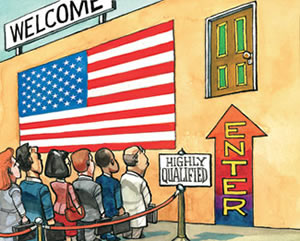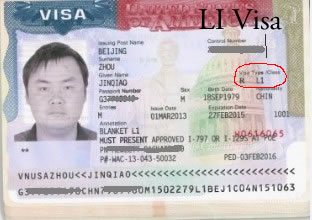Difference between H1 Visa, H1B and L1 Visa
Key Difference: H1 visa is a special visa that allows U.S.-based employers to hire foreign employees to work for them. The H-1B visa is a type of H1 visa that offers all the same benefits as the H1 visa, but this type of visa is specifically for professionals with Bachelor’s or Higher Degree or its equivalent or Certified Specialists. The L1 visa is a separate visa altogether and is offered to people who work in the subsidiary, branch or sister company of a company that is based in the United States.
 Traveling, living and working abroad are a dream for many people. These people want to leave their home country and work in a foreign country. With the United States and the United Kingdom’s promises of living a good life, a lot of people want to shift to the United States, even if it is to just work there. If a person wishes to live and work in the United States, he/she must apply for a particular visa that can allow them to live there. There are various different types of visa that are available depending on the type of work they will be performing.
Traveling, living and working abroad are a dream for many people. These people want to leave their home country and work in a foreign country. With the United States and the United Kingdom’s promises of living a good life, a lot of people want to shift to the United States, even if it is to just work there. If a person wishes to live and work in the United States, he/she must apply for a particular visa that can allow them to live there. There are various different types of visa that are available depending on the type of work they will be performing.
H1 visa is a special visa that allows U.S.-based employers to hire foreign employees to work for them. Under this visa, employers in the United States can temporarily employ foreign professionals to work for them. These professionals must hold a bachelors’ degree or something equivalent. However, depending on the type of visa, they can also be a skilled worker or have distinguished merit and ability. The person must also be from a "specialty occupation", which includes fields such as biotechnology, chemistry, architecture, engineering, mathematics, physical sciences, social sciences, medicine and health, education, law, accounting, business specialties, theology, and the arts.
The individual cannot file for themselves and must have an organization or a company to file the visa application for them. . An H1 visa allows the applicant to remain in the United States for a period of 6 years, after which he/she can file for an extension. For dependent family members, the applicant can file an H4 visa, which allows people depending on him to live with him. Another benefit of applying for the H1 visa entails that the applicant can also apply for a permanent resident status for himself and his family members. There are different types of H1 visas that are distinguished on the basis of the type of worker needed:
 H-1B – Professionals with Bachelor’s or Higher Degree or its equivalent or Certified Specialists
H-1B – Professionals with Bachelor’s or Higher Degree or its equivalent or Certified Specialists- H-1B1 – Free Trade Agreement workers in a specialty occupation from Chile and Singapore.
- H-1B2 – Specialty occupations related to Department of Defense Cooperative Research and Development projects or Co-production projects.
- H-1B3 – Fashion models of distinguished merit and ability.
- H-1C is for Registered nurses working in a health professional shortage area as determined by the U.S. Department of Labor.
The H-1B visa is a type of H1 visa that offers all the same benefits as the H1 visa, but this type of visa is specifically for professionals with Bachelor’s or Higher Degree or its equivalent or Certified Specialists. These people must hold a bachelor’s degree or a higher degree (Masters, PhD, etc.) They can also be skilled workers and hired for a particular reasons by the company. These professionals must belong to the fields mentioned above.
 The L1 visa is a separate visa altogether and is offered to people who work in the subsidiary, branch or sister company of a company that is based in the United States. It is also for the people who want to start a new branch or subsidiary in the United States and wish to send their own people to set it up. A person applying for this visa must be working for the subsidiary company for a full year in the past three years, after which the subsidiary or the parent company can apply for the visa on behalf of the guy. The employee should occupy a high position such as manager, executive or someone who has special knowledge.
The L1 visa is a separate visa altogether and is offered to people who work in the subsidiary, branch or sister company of a company that is based in the United States. It is also for the people who want to start a new branch or subsidiary in the United States and wish to send their own people to set it up. A person applying for this visa must be working for the subsidiary company for a full year in the past three years, after which the subsidiary or the parent company can apply for the visa on behalf of the guy. The employee should occupy a high position such as manager, executive or someone who has special knowledge.
L1 visa applications can also apply for permanent resident status in the United States if they wish to remain full time. Visa holders can remain in the country for a period of 7 years if under L1A visa or 5 years if under L1B visa, following which they cannot apply for an extension. However, if people under the L1A apply for a permanent resident status, they will be granted this status within a year of filing.
Difference between H1 Visa, H1B and L1 Visa:
|
|
H1 Visa |
H1B Visa |
L1 Visa |
|
Objective |
U.S. employers to temporarily employ foreign workers |
Planning to work as a professional for a company or organization |
Planning to work for the parent company in the United States or start a subsidiary in the US. |
|
Permanent Resident Status |
Holders have the option to applying for a permanent resident status |
Holders have the option to applying for a permanent resident status |
Holders have the option to applying for a permanent resident status |
|
Requirement |
A company must be willing to sponsor the applicant. |
A company must be willing to sponsor the applicant. |
The parent company must be willing to sponsor them. |
|
Employer |
Employers can hire foreign workers based on the sub-category: H-1B, H-1B1, H-1B2, H-1B3, H-1C |
Any U.S. based employer can hire a foreign worker |
L1 visa can only be filed by the parent, subsidiary, affiliate or branch of the foreign company where the alien is working at the capacity of manager, executive or special knowledge |
|
Prevailing Wages |
Must be paid at least the prevailing wages |
Must be paid at least the prevailing wages |
No requirements |
|
Payroll |
Must be on the payroll of the U.S. company |
Must be on the payroll of the U.S. company |
Can be on the pay roll of the US company or foreign company and be paid only the allowance in the US |
|
Spouse |
H4 visa holders cannot work in the US |
H4 visa holders cannot work in the US |
L2 visa holders can work in the US |
|
Approval from Department of Labor |
Required. Need attestation from the employer that qualified U.S. workers are unavailable |
Required. Need attestation from the employer that qualified U.S. workers are unavailable |
Not required. |
|
Blanket Petition |
Not available |
Not available |
Available |
|
Minimum Education Requirement |
Must hold at least a bachelor’s degree or equivalent. Can be a skilled worker or have distinguished merit and ability.
|
Must hold at least a bachelor’s degree or equivalent |
No requirement |
|
Maximum duration |
H1B – 6 years
Further extensions are provided |
H1B – 6 years
Further extensions are provided |
L1A – 7 years L1B – 5 years
No further extensions |
|
Green Card |
Need PERM labor certification approval to get a green card. Duration to get green card varies |
Need PERM labor certification approval to get a green card. Duration to get green card varies |
L1A - Green card available in EB1C category, which means the person can get a green card within one year of filing L1B – need PERM labor certification, duration varies |
Image Courtesy: media.economist.com, redbus2us.com, blog.csdn.net









Add new comment